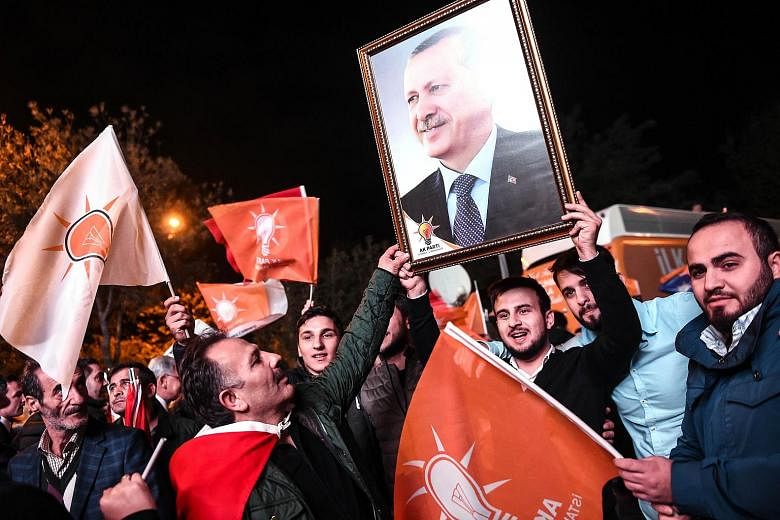Turkish President Recep Tayyip Erdogan has called on his ruling Justice and Development Party (AKP) to form a new government to "safeguard Turkey's achievements and stability" after it defied all expectations by winning an overall majority of parliamentary seats in Sunday's general election.
The mildly Islamist party won 49.4 per cent of the vote, which is expected to give it 316 out of 550 seats in Parliament.
While the financial markets responded positively to the results, Turkey's politics remain highly polarised, and it continues to face severe security challenges.
The results are a personal triumph for Mr Erdogan, who called early elections just months after a previous ballot in June gave the AKP only 40 per cent of the vote, depriving it of its parliamentary majority.
Instead of accepting that the AKP would have to share office with another party - a first for the ruling party since it came to power in 2002 - Mr Erdogan gambled instead on a fresh vote.
-
PM Lee congratulates PM Davutoglu on victory
-
Singapore Prime Minister Lee Hsien Loong yesterday wrote to Turkish Prime Minister Ahmet Davutoglu to congratulate him on leading the Justice and Development Party (AKP) to victory in the Nov 1 general election.
"The outcome reflects the confidence of the voters in your government. I am confident that under your leadership, Turkey will continue to enjoy strong economic growth and success," he said.
Mr Lee noted that the relationship between Singapore and Turkey has grown significantly in recent years, saying: "Many opportunities remain to deepen our cooperation as Strategic Partners."
"The signing of our substantive and comprehensive Free Trade Agreement (FTA) will give our relationship yet another boost. I look forward to working with you to further strengthen our bilateral ties," he added.
Both countries' trade ministers said in Istanbul last month they aim to sign the FTA on the sidelines of the G20 Leaders' Summit in Antalya, Turkey, this month.
It paid off spectacularly. Pollsters had expected similar results to those in June but the AKP increased its vote share by almost 10 per cent.
One reason for its revival is a collapse in the vote of the far-right Nationalist Movement Party. Another is that, alarmed by the security crises at home and abroad, Turkish voters swung back to the certainty of the AKP. Mr Erdogan's active campaigning also made a big difference.
Still, his victory is not as decisive as it seems. The Republican People's Party, the main secular opposition, has increased its tally, gaining the backing of a quarter of the electorate.
A party representing Turkey's Kurdish minority has also cleared the 10 per cent threshold required for parliamentary representation. Mr Erdogan, who always saw this party as his biggest threat, had wanted it kicked out of Parliament.
His longer-term objective of amending the Constitution in order to give himself more powers remains elusive. A "super majority" of 367 MPs is required to amend the Constitution, well beyond the AKP's reach. The AKP is also not able to resort to the only other way of amending the Constitution, which is to call for a referendum; that would require the support of 15 more MPs than the party has.
The remaining legal constraints on the President will not prevent him from running the country.
But the more he personalises power, the more he risks deepening the splits within the country.
Terrorist attacks by separatist Kurdish movements have already claimed the lives of hundreds of civilians and soldiers in the biggest spike in domestic violence since Turkey's bloody civil war in the 1990s. Mr Erdogan came to power promising autonomy to the ethnic Kurds, who account for up to a fifth of the country's population. But he is now fallen back on a vow to "crush" the separatists, something all previous Turkish governments failed to achieve.
Abroad, economically important relations between Turkey and Russia have deteriorated as have Turkey's links with Iran, just as the Iranians emerge from internationally imposed sanctions, offering juicy trade opportunities. And Ankara's objective of toppling Syrian President Bashar al-Assad, while also preventing the territorial disintegration of Syria, is unlikely to be realised either. Turkey's economy is expected to grow by 3 per cent this year, respectable by European standards but below target. Inflation, running in excess of 7 per cent, is a growing concern.
The latest election may have removed political uncertainty but the promised stability will be harder to attain.

